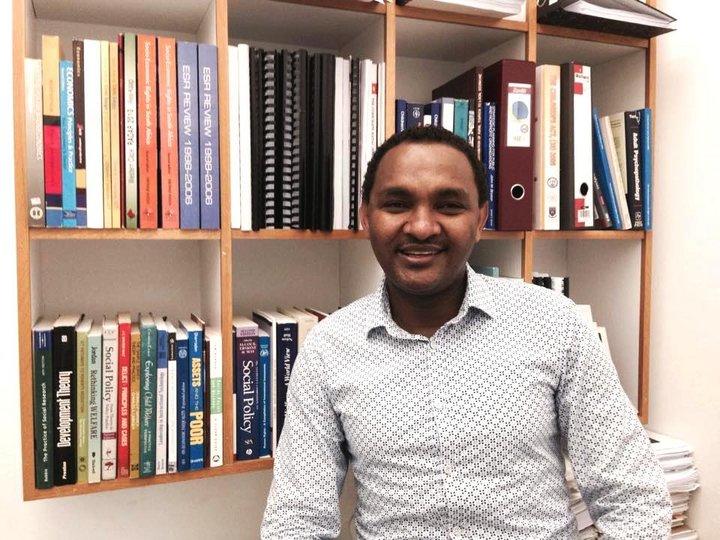Ethiopian student awarded Borlaug LEAP Fellowship to research wild coffee

Wild coffee in Ethiopia is threatened and earlier conservation efforts show mixed results. Mr Kassahun Kelifa, an Ethiopian PhD student, has been awarded the Borlaug LEAP fellowship to study the complex governance of land where wild coffee grows.
By Per Rudebjer, Head (ad interim) and Ewa Hermanowicz, Programme Assistant, Knowledge Management and Capacity Strengthening Unit.
Coffee, one of the world’s favourite beverages, is the backbone of Ethiopia’s economy. World Bank data indicate that coffee contributed to 32% of the country’s export value in 2011. The coffee sector benefits over 15 million rural people, the majority in the Southwest.
Economic analysis of the breeding value – for pest and disease resistance, low caffeine and high yield – of Coffea arabica genetic resources in Ethiopia’s highlands underscores the high value of wild coffee and the need for its conservation.
Yayo district in Ethiopia's Southwest region is considered the birthplace of Coffea arabica. Since time immemorial, coffee holds crucial roles in the social, economic and cultural lives of the smallholder farmers and offers substantial means of income. But the past decade has witnessed severe genetic material erosion of the wild coffee due to anthropogenic factors such as population pressure, commercial use and climate-induced forest cover changes. The need for preserving the wild coffee is becoming urgent and important.
Mr Kassahun Kelifa, an Ethiopian national, currently undertaking a PhD in Development Studies at the University of the Western Cape in South Africa, has been awarded the prestigious Norman E. Borlaug Leadership Enhancement in Agriculture Program (LEAP) fellowship to explore how wild coffee resources are controlled and how this affects the livelihoods of the local people.
Earlier efforts to conserve wild coffees in Yayo emphasized protectionist approaches, which marginalized smallholder farmers from the management and use of these resources. Traditional wild coffee governance practices that involve village leaders have been weakened. However, as the newly adopted approaches failed to improve the livelihood of the local people it could not offer lasting solution to the disappearance of the crop’s genetic material. Another threat is the occurrence of considerable coal deposit in Yayo district. Notably, state-owned extractive operations are taking place within and around wild coffee conservation boundaries and privately owned coffee farms. Competing interests over the same geographical space need to be understood and negotiated in order to safeguard wild coffee populations and generate equitable benefits to the interested actors.
Mr Kassahun’s research will:
- Document the historical and contemporary connection between the local people and the wild coffee in Yayo district, including the contribution of wild coffee to the livelihoods of the people, the customary resource governance and control patterns and the gender dimensions of access and use of wild coffees.
- Review the manner in which conservationists attempt to control the wild coffees and how this affects the socioeconomic wellbeing of the local people.
- Assess the processes of the coal mining operation and identify its key social effects on the local people.
- Determine the social and political implications of changing resource control trajectory and recommend sustainable ways of balancing conservation, mining and livelihood security needs in the Yayo district.
During his research, he will get mentorship from Jill Belsky, professor at Montana University and from Ehsan Dulloo of Bioversity International who has expertise in conservation and use of coffee genetic resources and carried out his own PhD research on ‘Diversity and conservation of wild Coffea germplasm in the Mascarene Islands’.
For more information, please contact Per Rudebjer
Photo: Kassahun Kelifa, Borlaug Fellow 2015. Credit: Kassahun_Kelifa
